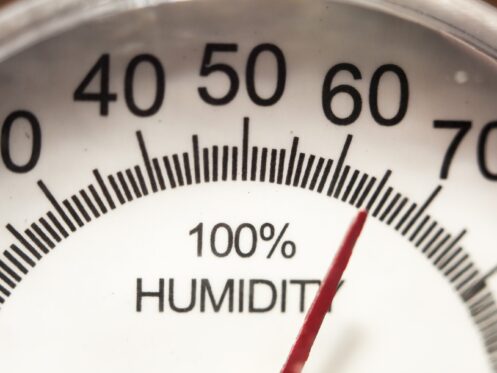Although you may not know it, the humidity level inside your Ronkonkoma, NY home or business affects its HVAC system. It also has a direct effect on your comfort while you’re indoors. However, if you’re like most people, you only have a passing understanding of the interplay between humidity and your HVAC. To remedy that, here’s everything you need to know about how humidity impacts your HVAC system.
Humidity and Cooling
Modern HVAC systems use a refrigerant to extract heat from indoor air and carry it outside to expel it. In the process, however, your HVAC also extracts moisture from the air and carries it away, too. There are three reasons for that. One is the fact that humid air is quite uncomfortable for humans. That’s because our bodies use evaporative cooling to control our body temperature. That’s what’s happening when you sweat. Your body’s releasing moisture, counting on it to evaporate into the air and carry heat away with it. The trouble is, when the air’s already humid, that process won’t work. As a result, we feel much warmer in humid conditions. So, your HVAC system must deal with humidity to keep you feeling cool.
The second reason that your HVAC unit removes moisture as it cools is that humid air holds more heat energy. Therefore, your system needs to extract humidity from the air to force it to release heat energy. Otherwise, your system would need to work much harder to provide the same level of cooling capacity.
The third reason that your HVAC system extracts moisture from the air is that it’s a byproduct of the cooling process. AC systems use an evaporator filled with very cold refrigerant to cool air, which causes condensation. The system catches that condensation as it drips off of the evaporator, relying on a drain line to remove it. If the system didn’t remove that water, its evaporator would freeze and halt the cooling process.
What Happens When It’s Too Humid in the Summer?
It’s important to understand that your HVAC system extracts moisture during the cooling process, but it has its limits. So, when the indoor humidity rises, your HVAC will begin struggling to reduce it. That will lead to more energy use and additional wear and tear on your unit. It will also have a noticeable impact on your comfort. It may force you to lower your thermostat further to feel as cool as you’d like. That, of course, further exacerbates the high energy use and wear and tear.
It’s also worth noting that excess humidity can lead to issues inside your building’s ductwork and HVAC system. For one thing, it can encourage the growth of mold and mildew. That can not only lead to long-term damage to your HVAC but to your health as well.
Humidity and Heating
In the winter, your HVAC may encounter problems with too little humidity. This happens because drier air is more difficult to heat. As a result, dry winter air will lead your heating system to use more energy to keep your home or building warm. It also forces your skin to release moisture, which cools you down when you don’t need it. This could force you to turn your thermostat up to compensate.
Also, conventional HVAC systems have no means of adding humidity to the air to improve their heating efficiency. Unlike air conditioners, furnaces and other heating equipment do not affect indoor humidity one way or another. This is a common misconception that many people have. The only meaningful effect a furnace can have on indoor humidity happens only if your building isn’t well sealed. Then, the furnace could end up colder, drier air into your building from the outdoors.
Controlling Indoor Humidity
Ideally, you want your indoor humidity to hover around 50% at all times. Most buildings rarely achieve this naturally, however. If you want to control the humidity inside your home or business, you’ll need to start by purchasing a hygrometer. That will let you know what the relative humidity is at all times. You may find that your indoor air is persistently humid or persistently dry. If you experience large swings in your indoor humidity, it could point to an air-sealing problem. In that case, you can use weather stripping and other means to tighten the range of indoor humidity you experience.
If your indoor humidity is only persistently slightly higher than it should be, your HVAC may hold a solution. It may be possible to adjust your HVAC’s blower fan to extend your system’s average operational cycle. That would provide more time for your HVAC to extract moisture while it’s running in the summer. If that’s not possible, you can replace your HVAC with a new system that features a drying mode. That’s a specific operational mode that slows down the system to prioritize dehumidification.
However, if you’re dealing with extremely high indoor humidity, you may need a purpose-built dehumidifier. You can purchase stand-alone models to lower humidity in specific rooms if you want to save some money. Or, you can buy a dehumidifier that attaches to your HVAC ductwork to remove excess humidity in your entire building. The latter is the best overall option because it will have the biggest positive effect on your HVAC efficiency.
If your indoor humidity is too low, however, you’ll need to take some different steps to correct it. For air that’s slightly too dry, a few lifestyle changes could make a big difference. For example, adding plants throughout your home or business might solve your dry air issues. Plants release moisture from their leaves, and the soil in their pots does, too. Plants with large leaves work best for adding humidity to the air. You could also try air-drying laundry indoors or boiling water on a stovetop periodically.
For a long-term solution, however, you may need to add a humidifier to your HVAC system. It releases moisture into the air as it leaves your HVAC system. This helps the air stay at the perfect humidity level in the winter. It also helps your heating system work at maximum efficiency at all times.
Your Trusted Indoor Humidity Experts
Whether you’re dealing with too much or too little indoor humidity in Ronkonkoma, NY, Cool Power LLC can help. We can help tune your HVAC for maximum humidity control. We also sell and install the latest models of humidifiers and dehumidifiers. Plus, we’re a full-service HVAC company that offers installation, repair, and maintenance services. That includes working on commercial HVAC systems.
We also offer 24/7 emergency services, so we’re always there when you need us. We’ve served the local community for over 50 years. And we’ve built an impressive reputation for quality workmanship and customer service in that time. We also offer financing options on approved credit to help you pay for the comfort solutions you require. We provide AC and heating installation and maintenance along with heat pump services. So, for the best humidity control solutions in Ronkonkoma, call Cool Power LLC today!


